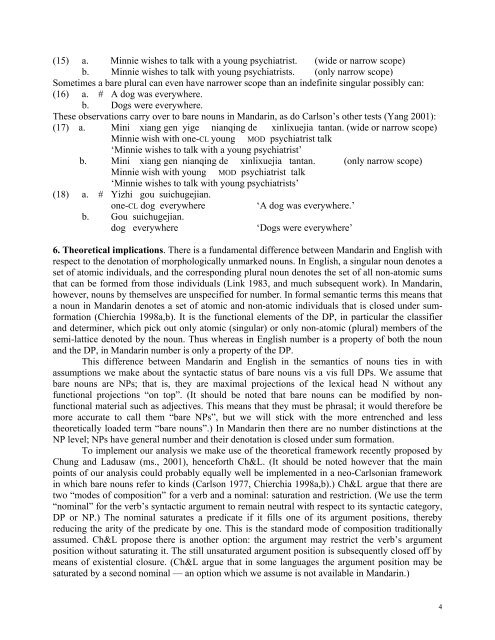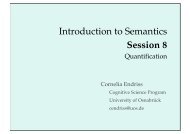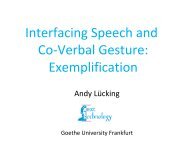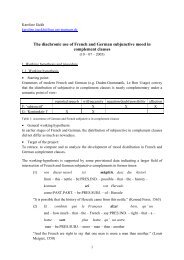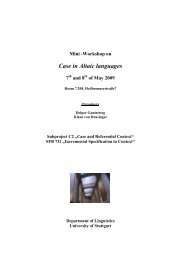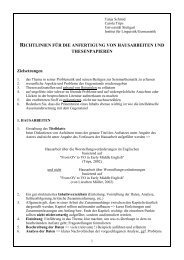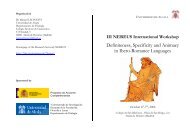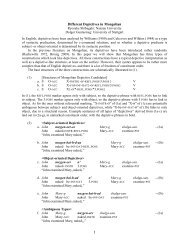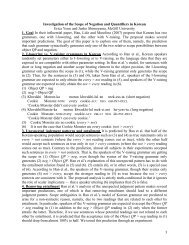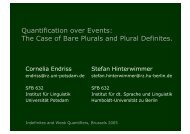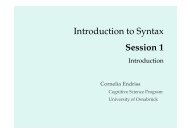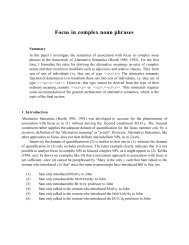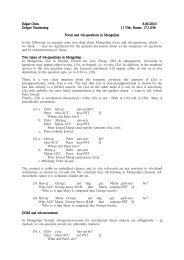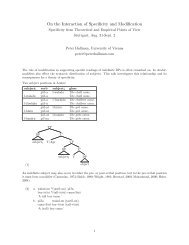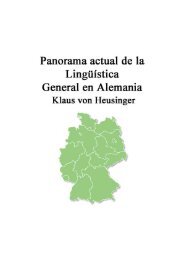SemPrag03.Progr.pdf - Institut für Linguistik/Germanistik - Universität ...
SemPrag03.Progr.pdf - Institut für Linguistik/Germanistik - Universität ...
SemPrag03.Progr.pdf - Institut für Linguistik/Germanistik - Universität ...
You also want an ePaper? Increase the reach of your titles
YUMPU automatically turns print PDFs into web optimized ePapers that Google loves.
(15) a. Minnie wishes to talk with a young psychiatrist. (wide or narrow scope)<br />
b. Minnie wishes to talk with young psychiatrists. (only narrow scope)<br />
Sometimes a bare plural can even have narrower scope than an indefinite singular possibly can:<br />
(16) a. # A dog was everywhere.<br />
b. Dogs were everywhere.<br />
These observations carry over to bare nouns in Mandarin, as do Carlson’s other tests (Yang 2001):<br />
(17) a. Mini xiang gen yige nianqing de xinlixuejia tantan. (wide or narrow scope)<br />
Minnie wish with one-CL young MOD psychiatrist talk<br />
‘Minnie wishes to talk with a young psychiatrist’<br />
b. Mini xiang gen nianqing de xinlixuejia tantan. (only narrow scope)<br />
Minnie wish with young MOD psychiatrist talk<br />
‘Minnie wishes to talk with young psychiatrists’<br />
(18) a. # Yizhi gou suichugejian.<br />
one-CL dog everywhere<br />
b. Gou suichugejian.<br />
dog everywhere<br />
‘A dog was everywhere.’<br />
‘Dogs were everywhere’<br />
6. Theoretical implications. There is a fundamental difference between Mandarin and English with<br />
respect to the denotation of morphologically unmarked nouns. In English, a singular noun denotes a<br />
set of atomic individuals, and the corresponding plural noun denotes the set of all non-atomic sums<br />
that can be formed from those individuals (Link 1983, and much subsequent work). In Mandarin,<br />
however, nouns by themselves are unspecified for number. In formal semantic terms this means that<br />
a noun in Mandarin denotes a set of atomic and non-atomic individuals that is closed under sumformation<br />
(Chierchia 1998a,b). It is the functional elements of the DP, in particular the classifier<br />
and determiner, which pick out only atomic (singular) or only non-atomic (plural) members of the<br />
semi-lattice denoted by the noun. Thus whereas in English number is a property of both the noun<br />
and the DP, in Mandarin number is only a property of the DP.<br />
This difference between Mandarin and English in the semantics of nouns ties in with<br />
assumptions we make about the syntactic status of bare nouns vis a vis full DPs. We assume that<br />
bare nouns are NPs; that is, they are maximal projections of the lexical head N without any<br />
functional projections “on top”. (It should be noted that bare nouns can be modified by nonfunctional<br />
material such as adjectives. This means that they must be phrasal; it would therefore be<br />
more accurate to call them “bare NPs”, but we will stick with the more entrenched and less<br />
theoretically loaded term “bare nouns”.) In Mandarin then there are no number distinctions at the<br />
NP level; NPs have general number and their denotation is closed under sum formation.<br />
To implement our analysis we make use of the theoretical framework recently proposed by<br />
Chung and Ladusaw (ms., 2001), henceforth Ch&L. (It should be noted however that the main<br />
points of our analysis could probably equally well be implemented in a neo-Carlsonian framework<br />
in which bare nouns refer to kinds (Carlson 1977, Chierchia 1998a,b).) Ch&L argue that there are<br />
two “modes of composition” for a verb and a nominal: saturation and restriction. (We use the term<br />
“nominal” for the verb’s syntactic argument to remain neutral with respect to its syntactic category,<br />
DP or NP.) The nominal saturates a predicate if it fills one of its argument positions, thereby<br />
reducing the arity of the predicate by one. This is the standard mode of composition traditionally<br />
assumed. Ch&L propose there is another option: the argument may restrict the verb’s argument<br />
position without saturating it. The still unsaturated argument position is subsequently closed off by<br />
means of existential closure. (Ch&L argue that in some languages the argument position may be<br />
saturated by a second nominal — an option which we assume is not available in Mandarin.)<br />
4


